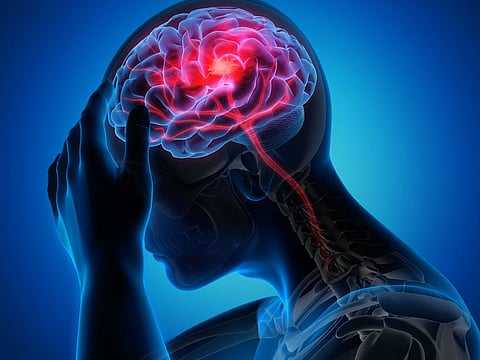World Stroke Day: Why are young UAE residents getting strokes?
Risk factors and preventive measures explained; stroke survivor writes book on awareness

Abu Dhabi: Stroke is the second leading cause of death and one in four people across the world is at risk of suffering a stroke during their lifetime.
The serious neurological condition is also a foremost cause of disability, with individuals experiencing a decline in their physical function and cognitive ability following a stroke.
A stroke occurs when the blood supply to a part of the brain is cut off, either because a clot has blocked the blood flow (ischemic) or because a blood vessel in the brain has burst (hemorrhagic).
Once limited to people of advanced age, strokes are now commonly experienced by people in their 30s and 40s. The condition can be life-threatening, and urgent medical attention is necessary.
In the UAE, where strokes affect around 10,000 people every year, the average age of a stroke patient is 45 years, which is 20 years younger than the global average.
Strokes are currently the third leading cause of death in the country and the second leading cause of disability, after road accidents.
Some reports say that 50 per cent of stroke patients in the UAE are below the age of 45 years.
Why young victims?
On World Stroke Day, observed on October 29, an expert in the UAE explained why younger residents are increasingly suffering from stroke.

Among the non-modifiable risk factors are age, genetic disorders and gender. Advancing age, inherited genetic risk, and being male increase an individual’s stroke risk, she explained.
What you can control
On the other hand, individuals can control the way they eat and live, and this ultimately has the most bearing on one’s likelihood of experiencing a stroke.
For instance, hypertension or high blood pressure is known to be a major cause of stroke and it can be controlled with dietary changes.
“One of the main reasons why people develop hypertension is excessive salt consumption, which causes the body to retain fluids and increase blood pressure,” said Dr Mifsud.
Lifestyle conditions like diabetes and obesity, which are themselves intricately linked, also heighten stroke risk.
“A diabetic person is likely to become overweight or obese, and when an individual carries extra weight, the excessive fatty tissue can cause inflammation. Thus, important blood vessels become narrowed, as the extra glucose in the blood makes it more likely to form clots.”
Dietary changes
When it comes to diet, it is essential to cut out processed foods to maintain low-sodium meals.
The UAE Ministry of Health and Prevention (MoHAP) recommends a daily intake of less than 2,300mg sodium which is equivalent to a single teaspoon of salt per day.
Adding a greater proportion of fruits and vegetables, while minimising the consumption of red meats, fried items and sugary foods, also helps reduce the ‘bad cholesterol’ associated with obesity and cardiovascular disease. This must be combined with a regular exercise regimen that allows for at least 30 minutes of activity every day, pointed out Dr Mifsud.
Widely prevalent risks
She pointed out that these lifestyle risks are unfortunately widely prevalent among young people today.
They are compounded by elements like stress – which is itself known to be a risk factor for stroke and cardiovascular diseases. The tendency among youth to opt for foods that elevate stroke risk, like processed meats and energy drinks, is also a major cause of concern, said Dr Mifsud.
“The odds may seem like they are against you, but one can greatly modify stroke risk. A healthy lifestyle that incorporates a fibre-rich and low-sodium diet, adequate intake of fluids, regular physical activity and good sleep hygiene goes a long way to mitigate one’s probability of suffering a stroke, especially when you are young.”
‘BE FAST’ to save lives
“On the off chance that a stroke does occur, quick action can help preserve a patient’s physical and mental functioning,” she highlighted.
“The acronym B.E. F.A.S.T. can help recognise the symptoms of a stroke – Balance, Eyes, Face, Arms, Speech, and the need for Timely action – so people should be aware of these signs,” Dr Mifsud added.
Stroke survivor releases book
World Stroke Day is earmarked for driving awareness about the condition, its risk factors, symptoms and the need to take timely action to reduce the burden of its prevalence and to better protect community members.
On the occasion of this year’s Stroke Day, a former Indian expat, who had left the UAE after suffering a stroke in 2021, returned to launch a book on his story of survival.

A week later, his right side became paralysed and Ammar spent three months under treatment. Since his right hand still feels numb, he said, he used a voice-to-text app to write the book in Malayalam: “Stroke—Survival Lessons.”
The 142-page book with 19 chapters contains opinions of expert doctors about stroke and the latest studies of the Indian Stroke Association and the World Stroke Association.
“I wanted it to be beneficial for those who are at risk and those who are sick. So, all preventive measures and what needs to be done when somebody suffers a stroke and my survival story have also been included,” he added.
The book is published by Page India Publishing, which is owned by the author. It was released in Dubai by Dr Azad Moopen, founder chairman and managing director of Aster DM Healthcare, who has also written a foreword.







